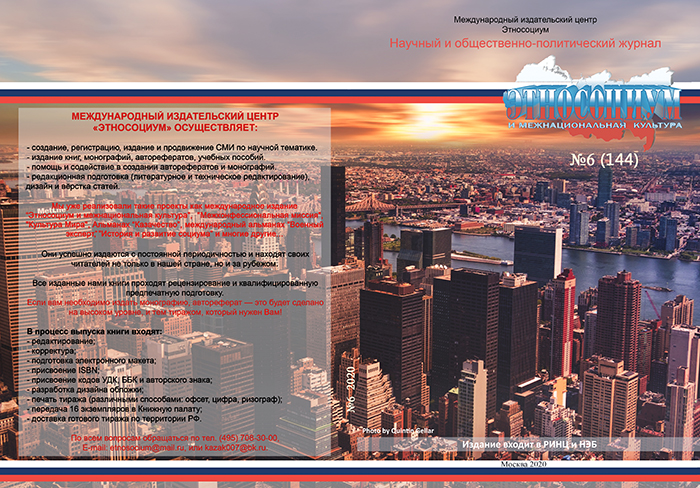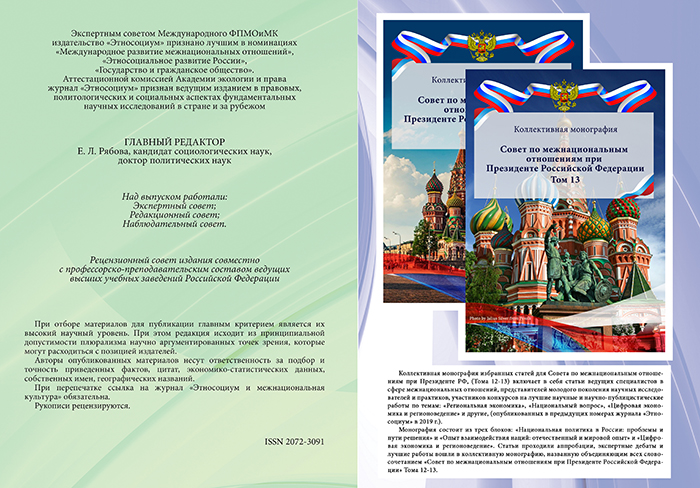

Content
|
COUNCIL OF INTERNATIONAL RELATIONSHIP
|
|
|
Ryabova E.L., Ternovaya L.O. Environmental Culture: a Search for Indicators of Social Protest
|
9
|
|
ACTUAL PROBLEMS OF MODERN SOCIETY
|
|
|
Dianov S.A., Andrianov A.V. The mechanisms of political and legal education of the media: from the practical experience of the 1980-1990s
|
18
|
|
REGIONAL STUDY
|
|
|
Andrianov A.V. Stages of development, problems and features of the work of school museums
|
28
|
|
INTERNATIONAL RELATIONSHIPS
|
|
|
Burda M.A., Mikhailova N.V., Grishin O.E. President's initiative D. Trump in the context of the formation and implementation of US immigration policy
|
40
|
|
Proskuriakov M.P. Traditions and prospects of interaction between Chinese and Russian RCT methods
|
50
|
|
Datukishvili E.Z. Media activities for the formation of state-civil identity in the post-soviet space (on the example of Azerbaijan, Georgia and Russia)
|
59
|
|
Biryukov S.V., Ryazanova O.E. Green Economy: From Concept to New Economic Model
|
68
|
|
REVIEW
|
|
|
Klimenko D.A. Italy in the international panorama
|
76
|
|
CONFERENCE
|
|
|
Golovach V.M. «The Russian way of speaking». On the history and status
|
79
|
|
Petrosyan P.A., Tamarchina N.A. On the role of Russia in the foreign policy of Finland of the Antti Rinne’s government
|
90
|
|
Nina Ramos Rocio Leonor World order transformation trends and potential of forming a new force center in Latin America
|
102
|
|
DISCUSSION CLUB
|
|
|
Volochkov I.V. Opportunities and prospects for using troubleshooting in the process of solving global world problems
|
116
|
|
Abstracts
|
127
|
|
Authors
|
140
|
|
Requirements to materials submitted to the international publishing house "Etnosocium"
|
143
|
The keen attitude of people towards the environment is a natural consequence of technological progress, which allows a person to take more and more natural resources for his needs. This concern is now increasingly taking on radical forms of environmental activism, which take place without taking into account the historical and cultural experience of reading the symbols of nature, which in the past guided people's actions to the development of natural resources. The return of reading skills of symbols of nature will help, on the one hand, reduce the intensity of radicalism in the environmental movement, and, on the other hand, create the basis for a more careful attitude to nature.
Keywords: ecology, semantics, ecological culture, symbols, ecoactivism.
The article presents the author's vision of the process of transition from political control over the mass media to the format of political and legal education. At the end of the 1980s, a unique political situation developed in the Russian state, when mechanisms for developing the principles of information culture and media communication, rather than repressive levers of influence on the media, were required. The creation of the General Directorate for the protection of state secrets in the press and other mass media (GUOT) is recognized as an original decision of the power groups. In the regions of the country, employees of this Agency were assigned to conduct activities aimed not only at protecting state secrets in the press, but also to provide methodological, Advisory and expert assistance to publishers and journalists. In the rapid rhythms of the era of perestroika and glasnost, their activities are recognized as appropriate and useful for publishing. In modern conditions, according to the authors, it is quite appropriate to talk about the demand for the Institute of political and legal education of people whose professional activities are connected with the mass media.
Keywords: political education, legal education, power groups, political consulting, mass media, democratization, region, publishing, freedom of the press.
The history of school museums in Russia, as well as any public or private Museum (collection), has its own history and stages of formation and development.
This article will cover three stages of creating school museums:
- The first phase of Tsarist Russia of the XVIII-beginning of XX century;
- Second stage of the USSR beginning of the XX century-1990;
- The third stage of the Russian Federation 1991-present.
The result of their formation is the sum of the necessary conditions for the creation of a Museum at any historical stage.
First: maturing the idea, according to the public request, attracting sponsors and patrons to cooperate.
Secondly, the choice of the optimal and useful location of the Museum itself and the possibility of its maximum demand by society.
Third: the Grand opening of the Museum. Organization of educational, research and research work among students and society of the region's population. Development of Museum exhibitions.
Special attention will be paid to the third stage.
Keywords: school museums, Russia, education, upbringing, expositions.
The article examines the activity of the US President D. Trump in the context of the formation and subsequent implementation of American migration policy. It is noted that the immigration policy of the United States only in the second half of the XIX century became the object of regulation of the Federal Executive power. It is stated that the high popularity of immigration in the United States, the activation of the nativist movement, the demands of American labor unions, led to the need to develop tools for regulating external migration in the form of various restrictions, and later the institution of visas that give the right to enter the United States. The principle of separation of powers, as well as the system of checks and balances that operates in the American political system, currently does not allow D. Trump will fully implement his campaign promises to limit foreign migration. As a result, the ideas of modern nativism that protects the traditional American identity are still strong in American society, and the threats associated with mass illegal migration occupy a significant place in the modern political agenda.
Keywords: immigration policy, migration law, nativism, restrictionism, illegal migration, USA, D. Trump.
In connection with the development of global integration processes, the concept of multilingualism is becoming increasingly relevant. Therefore, the desire to master one or several languages in order to use them in communication, as well as for mutual understanding, to acquire new knowledge, is growing. The article discusses the traditions and prospects of interaction between Chinese and Russian methods of RCT, defines the basic provisions of such interaction, presents various options for studying RCT.
Keywords: Russian as a foreign language, Chinese students, teaching methods, RCT methods.
This scientific article is devoted to the analysis of the media activities in the formation of state-civil identity in Azerbaijan, Georgia and Russia. Based on the historical and cultural analysis and research on the current state of civic identity in the countries studied, the author came to the conclusion that the need for effective state building in post-Soviet countries such as Georgia and Azerbaijan led to the promotion of national myths by the media of these states, within which a special role was played by attempts to create Transcaucasian states in 1918.
The priority of the national language in the information space of Azerbaijan and Georgia was also the result of the need to protect civil identity from the excessive cultural influence of countries such as Russia, Turkey and Iran. The Russian socio-political context, as emphasized in the article, predetermined the specifics of the Russian media activity in the formation of state-civil identity, in which the utilitarian use of the positive aspects of Russian history and modernity, uniting the Russian nation around common values, occupies a central place.
Keywords: civic identity, national television, electronic media, national culture, traditional values, nationalism, national myth, consolidation of society, xenophobia, multiculturalism.
In modern Russia, the green economy as a concept and component of economic policy is gradually entering the agenda. This category is at the intersection of economic analysis proper and the study of environmental policy. The green economy has also gained recognition as a special object of public policy and public administration. The understanding of the green economy as a strategic direction of social development is gradually being established in the expert and research communities. Analyzing the achievements and failures, as well as promising directions for the deployment of the mentioned project, is an important task for modern researchers. Among the more specific tasks associated with the process of conceptualizing a green economy, one should link this concept with the characteristics and needs of regional and local development, with the problems of modernization (structural restructuring) of the economy and social sphere, with new strategies and management technologies. It is this conceptual “diversification” that will allow, in the opinion of the authors, to turn the project and strategy of the green economy into an effective tool for the development of Russia and its regions.
Keywords: green economy, economic analysis, clean technologies, energy saving, environmental responsibility, environmental policy, government policy, sustainable development.
Brief evaluative analysis of the monograph.
Keywords: Italy, international relations, culture, changes, transformation.
The article analyzes ethno-linguistics factors active in the historic development of Belarus. Highlighted is the role of the Orthodox Church in the dissemination of the Russian language on the Belorussian territory. The theory of zapadnorusizm, which understood the Belorussian lands as the Western Rus’ and part of the united «Russian breed», is highlighted as well as the works of its main representatives. In conclusion, the article analyzes the present situation with the spoken languages in the republic.
Keywords: Orthodox Church, Belarus, Catholicism, Uniatism, ethnolinguistic factors of development, the Grand Duchy of Lithuania, M. Koyalovich, E. Karskiy, Western Russianism, Polonization.
This article describes the basic principles of the policy of the cabinet of Antti Rinne during his leadership of the State Council of the Republic of Finland in relation to the Russian Federation. With the help of content- and discourse analysis, all press releases of the Finnish government were analyzed, priority areas of foreign policy were highlighted, as well as the context of mentioning Russia in the presented press releases. Three hypotheses have been confirmed – that Russia is mentioned more often than other states and organizations (except the European Union), that Russia is most often mentioned in a neutral context, and that Russia was most often associated with public diplomacy during the cabinet Prime Minister Antti Rinne The article can be used as analytical material in the formation of the foreign policy of the Russian Federation in relation to Finland.
Keywords: Finland, Russia, national interests, bilateral relations, foreign policy, Antti Rinne.
The article analyzes the types of world order and presents the characteristics of key centers of power in the transformation of the world order from a unipolar to a new world order. The analysis of the potential of forming a new center of power in Latin America, as well as the potential of Brazil to become the core of this center was carried out. It is shown that Russia шы interested in strengthening the political potential of Latin America, while the United States will oppose this, considering these countries a zone of its exclusive national interests.
Keywords: world order, Latin America, Brazil, unipolar world, polycentric world.
The article is devoted to the study of the possibilities and prospects of using troubleshooting in the process of solving global global problems using the example of the coronavirus infection COVID-19 pandemic that happened in 2020. In the course of the study, a comparison was made of various methods and their effectiveness for choosing the best options for solving global world problems. Also, a scheme for solving the problem of preventing, stopping and minimizing the spread of infections using troubleshooting has been formalized. Using the example of a fragment of work with the Algorithm for Effective Problem Solving (AERP), the practical aspects of using troubleshooting to combat a pandemic are considered. According to the author, a similar algorithm, by analogy, can be used to solve other global world problems.
Keywords: troublehacking, pandemic, coronavirus, counteraction.